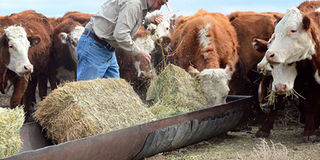Brief news on farming and agribusiness from around the country

A dairy farmer feeds his livestock. A farm technology expo will, starting this Wednesday, be held at the Kenya Agricultural and Livestock Research Organisation (Kalro) in Naivasha. FILE PHOTO | NMG
What you need to know:
- Dr Jack Ouda, the director, knowledge and information management at Kalro, said various kinds of technologies, from seeds to machines, will be exhibited.
- Dr Gospel Omanya, TAAT maize compact lead in Africa, said the programme will strive to reach at least 2.4 million people in Kenya, especially from farming families, ensure an additional 12 million tonnes of maize is generated and boost incomes by at least 20 per cent for farmers.
- Kenneth Agatziba, the AI technical officer at the One Acre Fund, said milk production for many farmers in the county has gone up as they adopt crossbreeds.
- One of their biggest challenge for the small farmers in the county is finding good market for their milk.
Expo promises better tidings for farmers
Crop spraying, planting demonstrations and livestock technologies will be among the offerings at the farm technology expo, which will be held at the Kenya Agricultural and Livestock Research Organisation (Kalro) in Naivasha starting Wednesday.
The two-day event will bring together small and large-scale farmers, who will not only see how things should work on the farm, but they will also learn how to do them.
Dr Jack Ouda, the director, knowledge and information management at Kalro, said various kinds of technologies, from seeds to machines, will be exhibited.
“We will not only display machineries but also demonstrate how they work. If a company showcases a milking machine, it will also demonstrate live how the machine does the work,” he said.
Dr Ouda said there will be no entry charges to attend the show. He noted that for farmers to succeed, they have to embrace technology and get knowledge on what to farm and how to farm.
“There is no way a farmer who wants to avoid failure will run away from seeking knowledge.
-Rachel Kibui
****
Sh250m grant to boost maize production
The African Development Bank (AfDB) has announced a Sh250 million grant to boost food security interventions.
The funding that targets the maize value chain was announced this week during the launch of the Technologies for African Agricultural Transformation’s (TAAT) maize compact, a programme that aims to increase the commodity’s production in Kenya by at least 30 per cent.
Dr Gospel Omanya, TAAT maize compact lead in Africa, said the programme will strive to reach at least 2.4 million people in Kenya, especially from farming families, ensure an additional 12 million tonnes of maize is generated and boost incomes by at least 20 per cent for farmers.
“At least 40 per cent women and 25 per cent youth participation in the maize value chain will be ensured in the three-year programme,” said Dr Omanya.
Dr James Karanja, TAAT’s maize value chain representative in Kenya, said maize is one of the priority crops in the Big Four. “The grant is timely because Kenya continues to lag in maize production despite better inputs,” he said.
-Brian Okinda
****
Milk production rises for small farmers after taking up artificial insemination
Chrispin Wafula has two cows, one he inherited from his uncle and a dairy cow he was given by the county government of Kakamega through the ‘One Cow Initiative’ programme.
The farmer is working to improve his herd using artificial insemination services that are now readily available in the county.
“Initially, my indigenous cow used to produce two litres of milk per day. But now a crossbreed is offering me 15 litres,” he said, adding that he is getting technical support from officers from One Acre Fund, an NGO.
While he grazes his cows and offers them napier grass, he further gives them salt lick and dicalcium phosphate, a dietary supplement, with regular sprays to control diseases.
Kenneth Agatziba, the AI technical officer at the One Acre Fund, said milk production for many farmers in the county has gone up as they adopt crossbreeds.
“One of the major advantages of AI is that it the most effective low-input, high-out livestock management practice that local small-scale farmers can easily adopt. It also allows farmers to mix imported breeds with local cattle to create a superior cross-breed at minimal cost,” he said.
He added that AI reduces disease transmission and increases the efficiency. It also extends animals’ reproductive lifespan.
Colleta Wasike from Burangasi village in Sidikho sub-location, also keeps cows, and she said production has increased from four to eleven litres per day.
However, one of their biggest challenge for the small farmers in the county is finding good market for their milk.
-Shaban Makokha





